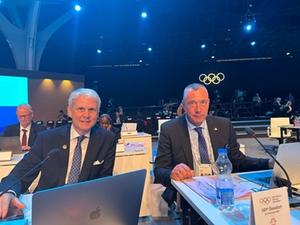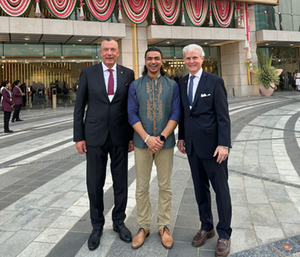FIL President Fogelis and Secretary General Bell at the IOC Session in Mumbai

Mumbai (FIL/17 Oct 2023) The 141st Session of the International Olympic Committee (IOC) took place from October 15 to 17 in Mumbai, India.
In his opening speech, IOC President Thomas Bach spoke about the Olympic Agenda 2020+5, the IOC's strategic roadmap for the Olympic Movement until 2025, covering topics such as climate change, sustainability, inclusion, anti-discrimination, safe sport, human rights and the next Olympic Games.
Artificial intelligence in sport and e-sports were important topics for the IOC President: "I have asked our new IOC Esports Commission to study the creation of Olympic Esports Games. AI and Esports - these are our two opportunities. To seize these opportunities and manage the risks, we need a new mindset. We need the mindset of young people. We need to trust them and empower them, because the pace of change is going to be exponential," said Thomas Bach, underlining his principle of "change or be changed".
Cortina won't build artificial track for 2026 Olympics
During the 141st IOC Session in Mumbai on Monday, October 16, 2023, the Milano-Cortina 2026 Organizing Committee and the IOC Coordination Commission announced that it has been decided not to pursue the construction of a new track in Cortina. Instead, the Milano-Cortina 2026 Organizing Committee will work with the IOC and FIL/IBSF to find an alternative venue for the luge, bobsleigh and skeleton events. This decision is expected to be made by the end of the year.
"It will be important that this alternative venue is found soon so that the necessary improvements and preparations can be made for a first-class Olympic experience for our sport," said FIL President Einars Fogelis.
2030 and 2034 Winter Olympic Games to be awarded in a double deal
Following a proposal by the IOC Future Host Commission, the 2030 and 2034 Winter Olympic Games will be awarded in a double bidding process with the condition that existing venues are used. This will ensure that the winter sports of the 2026, 2030 and 2034 Olympic Winter Games will be held in existing venues, underscoring the goal of sustainability and mitigating the impact of climate change on luge, other international winter sports federations and the Olympic Winter Games. The 141st Session of the IOC approved this proposal by the Executive Board on Sunday, October 15 in Mumbai. The IOC wants to "buy time to deal with the dramatic effects of climate change," said IOC President Thomas Bach. The double award is scheduled for the 2024 IOC Session in Paris.

Russian Olympic Committee suspended
On Thursday, October 12, 2023, the IOC Executive Board suspended the Russian Olympic Committee with immediate effect. The unilateral decision of the Russian Olympic Committee on October 5, 2023 to admit as members the regional sports organizations under the National Olympic Committee (NOC) of Ukraine (namely Donetsk, Kherson, Luhansk and Zaporizhzhya) is a violation of the Olympic Charter as it violates the territorial integrity of the NOC of Ukraine, which is recognized by the International Olympic Committee (IOC) in accordance with the Olympic Charter.
In view of this, the IOC Executive Board (EB) has decided to suspend the Russian Olympic Committee until further notice. As a result of this suspension, the Russian Olympic Committee is no longer entitled to operate as a National Olympic Committee under the Olympic Charter and cannot receive any funding from the Olympic Movement. The IOC reserves the right to decide in due course on the participation of individual neutral athletes with Russian passports at the Paris 2024 Olympic Games and the Milan Cortina 2026 Olympic Winter Games. The IOC EB also reserves the right to take further decisions or actions depending on how this situation develops.
Returning after 40 years - India's history in the Olympic Movement
The IOC returns to India after 40 years. In 1983, the 86th IOC Session was held in New Delhi from March 26-28. India has a long history in the Olympic Movement. It goes back more than 100 years. In 1900, Norman Pritchard, the first Indian-born male athlete, participated in the Paris Games and won the silver medal in the 200m sprint and 200m hurdles.
Twenty-four years later, at the 1924 Paris Olympics, the Indian team consisted of seven track and field athletes and seven tennis players, including the first Indian female Olympian, Nora Polley. In Amsterdam in 1928, India won its first gold medal in the men's field hockey tournament. It was the beginning of a golden run. Through Melbourne 1956, the Indian men's team won six gold medals in a row.

Since 1900, India has brought home a total of 35 medals from the Olympics, including two individual gold medals. One was won by Abhinav A. Bindra OLY, who is now a member of the IOC Athletes Commission, and the other went to Neeraj Chopra, who won gold in the javelin at the 2020 Tokyo Olympics. He is now a household name in India. Our colleague Tina Sharma Tiwari recently met and interviewed him in Lausanne (here: https://lnkd.in/eMfsZsie). Shortly after the Tokyo Games, he donated his winning javelin to the Olympic Museum in Lausanne (see photo).
India has also participated in the Winter Olympics. The most famous Indian winter athlete is the luger Shiva Keshavan, who participated in the Games six times between 1998 and 2018.
FIL President Einars Fogelis (LAT) and FIL Secretary General Dwight Bell (USA) met six-time luge Olympian Shiva Keshavan during the IOC Session. India's most successful winter sports athlete is now a sports official of his country. Einars Fogelis and Dwight Bell also spoke with him about the integration of luge into the Asian Games.









